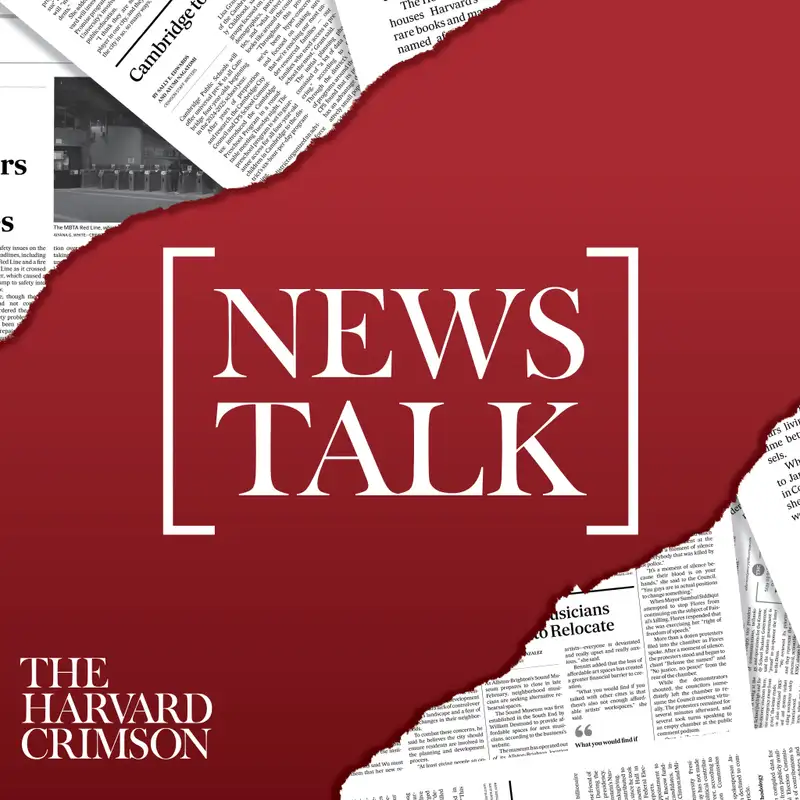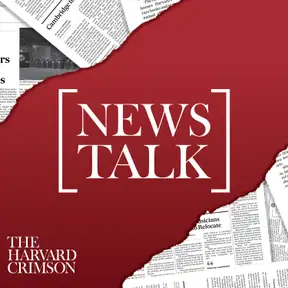
The Saga of Francesca Gino
From 14 Plympton Street, this is Newstalk. I'm Yael Goldstein. On March 19th, Harvard Business School professor, Francesca Gino, suggested that BU professor, Nina Majar, may have tampered with her data in a 2012 study. This is the most recent development in the case involving allegations of data manipulation against Professor Gino. 2 reporters join us to discuss how this all began and what we can expect to happen moving forward.
Benjamin Isaac:My name is Benjamin Isaac.
Kyle Baek:My name is Kyle Baek, and we are on the Harvard Business School beat.
Yael S. Goldstein:Thanks for joining me, Kyle and Ben, to discuss the allegations against Francesca Gino and some of the more recent developments in her case. So before we dive into where this all began, give me a sense of who professor Gino is as an academic.
Kyle Baek:Professor Gino is a Harvard Business School professor who focuses on behavioral issues.
Benjamin Isaac:She's part of a school of behavioral scientists that sort of made a name for themselves in the early 2000s. They touted these kind of revolutionary insights just by framing issues differently. One of our most famous studies was a 2012 paper with 4 other coauthors that purported to show that respondents who signed their name as well as an honesty pledge at the I would say that they launched Gino's career and she became a micro celebrity within the field of business professors and behavioral economics.
Yael S. Goldstein:When exactly did the controversy actually begin?
Benjamin Isaac:As people began to try to replicate the findings of the influential 2012 study, again and again, authors were failing to replicate their findings. In 2020, the original crew being Francesco Gino, Max Bazerman, Dan Ariely, Lisa Hsu, and Nina Major got together to try and replicate the original findings. There was tension, among the group because they couldn't replicate their original findings. Fast forward to 2021, Data Colada, a data investigation blog composed of different professors from around the world notified the Harvard Business School that they thought there was something suspect about the study.
Yael S. Goldstein:Can you tell me a little bit more about who they are and why their criticism of professor Gino's studies is relevant?
Kyle Baek:So Data Colada is a quantitative analysis blog and the coauthors, Yuri Simonson, Lifty Nelson, and Joseph Simmons urged journals to make sure that the data that they are using isn't fraudulent. I think what
Benjamin Isaac:makes Gino's case stand out is its prominence. Francesca Gino really was a celebrity in her own world. You know, she's a Harvard professor. But, also, she made her career on studying dishonesty. And here she was, you know, facing allegations of of data manipulation in all of these different studies.
Yael S. Goldstein:So how exactly did Harvard Business School react to these allegations put forth by Data Colada?
Benjamin Isaac:They decided to take a look themselves. So very shortly after Data Colada posted their blog posts publicly accusing Gino of data manipulation. HBS initiated an investigation of Gino and her academic practices.
Yael S. Goldstein:So what exactly did that investigation look like? What details do we have?
Benjamin Isaac:This was an 11 month investigation. It was undertaken in confidentiality. They interviewed a significant number of people that had worked with and around Geno. They did extensive interviews with Geno. They did statistical and forensic analysis on different studies that she published ultimately to try and judge whether or not the allegations against her had any weight.
Benjamin Isaac:But no direct evidence against her is required by the HBS internal policy. They do things on preponderance of the evidence, which means more likely than not. And what that means for Gino is that all they need is circumstantial evidence against her.
Yael S. Goldstein:Alright. So amidst all these allegations and this investigation from HBS, how is Gino herself reacting to the accusations that she's facing?
Benjamin Isaac:So this summer, Gino filed a defamation lawsuit against Harvard and as well as against Data Culada. She's also suing Harvard for gender discrimination, and she's also alleged that Data Culada and Harvard conspired to ruin her reputation as an academic. And treat tenured professors. Gino claims that this policy was custom made for her and then weaponized against her. She's also contended that she was treated unfairly, and that's basically what's reflected in the gender discrimination suit.
Benjamin Isaac:She's claimed that there have been other analogous cases where male professors have done what she thinks are behavior similar to what's alleged that she did, and they were treated with kid gloves, she says. And that's a big part of what she's suing about.
Kyle Baek:Professor Gino is denying every single allegation against her. She is refuting any wrongdoing. And she even goes on to say that this is an incompetent investigation that really undermines her ground to fight back against these claims.
Yael S. Goldstein:So there's been no precedent for revoking tenure for a Harvard faculty member then?
Benjamin Isaac:Absolutely not. So Gino, in fall 2023, was barred from campus and stripped of her endowed faculty title. HBS also began taking steps to revoke her tenure. And if she lost her tenure and was terminated, she would be the first Harvard professor for that to happen to. It would be a huge precedent to set.
Yael S. Goldstein:So I'm wondering if professor Gino is advocating for herself alone or whether colleagues in the field or faculty members at HBS have come out in support of her.
Benjamin Isaac:Gino is absolutely leading the charge in her defense. Got a big website, Gino v Harvard, where she posts public statements about her defense. Gino has some defenders in the field. They point to inconsistencies in the process with how HBS treated her and also to the fact that there is truly no direct evidence against her that we know of, and that's a central component of Geno's case as well.
Yael S. Goldstein:So what are the most recent developments in this case?
Benjamin Isaac:So the most recent development was when the report that HBS authored during its investigation documenting the entire investigation was released to the public. It's roughly 1300 pages in length. The report documented a lot of the evidence against Gino, as well as Gino's initial defenses. She had 2 main defenses outlined in the report. 1 was honest error, and the second was that someone other than her, a malicious actor, had manipulated the data instead of her.
Benjamin Isaac:The Crimson identified the primary actor that she identified in the report as professor Nina Mažar at BU. The report found it unlikely that either of these explanations were credible. 1, because robust statistical analysis showed that this manipulation was unlikely to be found by chance, and 2, that Gino was the only person across all four studies. And the allegation pertaining to Mažar really only was revolving around one study. So they thought, well, that doesn't really explain the other 3 that we're we're looking
Yael S. Goldstein:at. So what specifically was this allegation against Mažar?
Benjamin Isaac:Gino stipulated that Mažar had the means and the motive to manipulate data in their original 2012 study in order to make Gino look bad. She pointed to the fact that Mažar could have plausibly had access to her Qualtrics account, which was the platform that they use to collect and analyze data. And she also pointed to a series of interactions that indicated tension between several co authors and a conversation between her and Mažar that she concluded might have represented a threat. Mažar has said that Gino's claims against her have no basis in reality.
Yael S. Goldstein:So what new developments can we expect in the near future? Where is this case going?
Benjamin Isaac:Sometime this spring or summer, a judge will rule on whether most of Chino's claims against Harvard will proceed. And then if they pass muster, the case will then move into discovery, the process by which both sides of the lawsuit seek information to prove their case. I see 2 broader implications to the story. The first is there's a replicability crisis in the field of behavioral economics, behavioral psychology. This is just one more point that people think about when they consider the credibility of the field at large.
Benjamin Isaac:The allegations against Gino concern just 4 studies of her massive corpus, and the next step that everybody is going to be taking is is looking through all of her other work and seeing if she manipulated data the way that she's alleged to have manipulated in her original studies. The second is that this is a very expensive and time consuming lawsuit that's been consuming data collater who hasn't posted since the lawsuit. They were named in the lawsuit by Gino. There are concerns that this case will have a chilling effect on data investigation blogs and independent researchers who are looking for data integrity simply because they don't wanna have to pay the sort of legal fees that these cases are incurring. Looking forward to the lawsuit, it's entirely possible both that Gino has a case against Harvard and that she really did what people are alleging that she did.
Benjamin Isaac:It's illegal to change standards and then enforce them retrospectively in a way that makes people worse off. To the extent that Gino even if she did manipulate data in the way that they said she did.
Kyle Baek:The atmosphere on campus is one of intrigue, and a lot of students are just interested about what the outcome may be.
Benjamin Isaac:Everyone's waiting to see where this case is gonna go.
Yael S. Goldstein:Thank you so much for joining me, Kyle and Ben, to discuss this controversy surrounding professor Francesca Gino.
Benjamin Isaac:Thanks so much for having us. It's been a pleasure.
Kyle Baek:Thank you.
Yael S. Goldstein:This episode of Newstalk was hosted by Yael S. Goldstein. Producers of this episode are Yael S. Goldstein and Frank S. Zhou. Our multimedia chairs are Julian J. Giordano and Addison Y. Liu. Our associate managing editors are Claire Yuan and Elias J. Schisgall. Our managing editor is Miles J. Herszenhorn. Our president is J. Sellers Hill. Music in this episode is from freesound.org. From Plympton Street, this is Newstalk.



